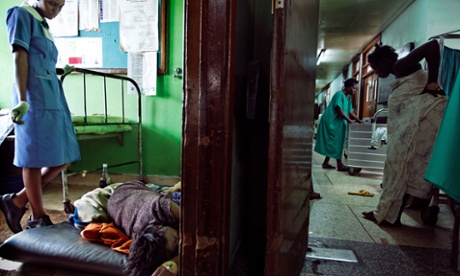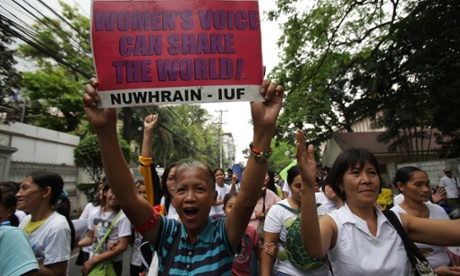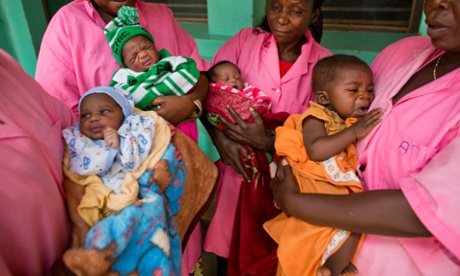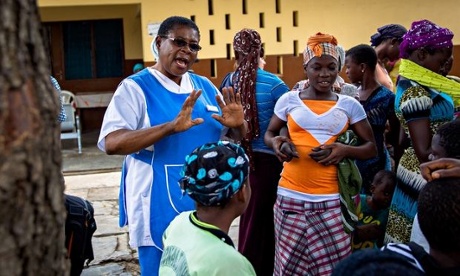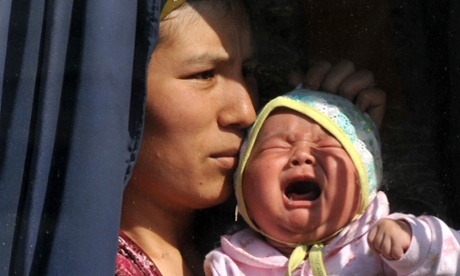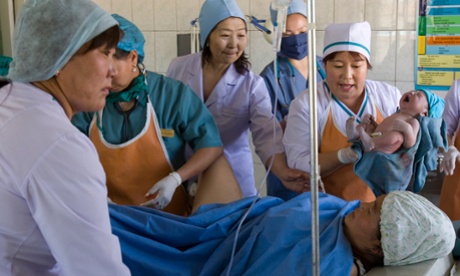Remmie Wamala, who worked at the Ugandan parliament, died in childbirth at a hospital in Kampala two years ago.
“My mother did everything; [but] she was left to bleed to death after giving birth,” said her 10-year-old daughter, Shonel Lunkuse.
Speaking at a citizens’ hearing, held last week to campaign for better healthcare in Uganda, Shonel said: “It was only one midwife in a room trying to help two women to deliver. Life has been a struggle ever since my mother died.”
Shonel’s mother became part of an ugly statistic – in 2013, an estimated 5,900 women in Uganda died of pregnancy-related causes, according to figures from the World Health Organisation. That equates to 360 maternal deaths for every 100,000 live births.
One in 44 women in Uganda has a lifetime risk of maternal death.
Globally, the maternal mortality ratio has dropped by 45% since 1990, but there are big disparities between rich and poor countries. The estimated maternal mortality ratio in developing countries in 2013 was estimated at 230 for every 100,000 live births compared with 16 in developed countries.
Meanwhile, the death of children under five worldwide declined from 12.7 million in 1990 to 6.3 million in 2013. Last week’s citizens’ hearing was one of several that have been organised around the globe in recent months to garner support for reproductive health and childcare.
The hearings, organised by the White Ribbon Alliance for Safe Motherhood, the International Planned Parenthood Federation, Save the Children and World Vision, have been held in more than 25 countries, including Afghanistan, Bangladesh, Burkina Faso, the Democratic Republic of the Congo and Uganda. They have involved thousands of people and at least 400 local organisations.
From the hearings, people are calling on governments to account for their promises on delivery of millennium development goals (MDGs) four and five – to reduce maternal and child deaths – as well as pushing for strong targets in the new sustainable development goals (SDGs).
On Thursday, the recommendations from the hearings will be presented to the UN secretary general, Ban Ki-moon, by a Ugandan maternal health advocate, Faridah Mwanje Luyiga.
Next week, activists will attend the World Health Assembly – the world’s highest health policy-setting body – to advocate for decent healthcare for women, children and adolescents.
“We need a united voice calling for a fairer world for all children and ambitious goals that will deliver zero poverty and zero preventable deaths of children,” said World Vision in a statement.
Recommendations from Uganda’s citizen hearings include ensuring universal access to family planning, a review of procurement processes to help speed them up, improved emergency obstetric and newborn care at health centres, and prioritising the recruitment and retention of healthcare workers.
In Uganda, for every 1,000 live births, 69 children die before they reach their fifth birthday; 33% die in the first four weeks of life.
There is a belief, though, that a lot can be achieved with the SDGs if people are engaged and empowered to hold their leaders accountable.
“With less than 200 days remaining until the end of the MDGs, we want to highlight how much more can be achieved by the replacement sustainable development goals if citizen leaders are supported to lead the change and continue to work with and push governments to deliver,” said Betsy McCallon, the executive director of the White Ribbon Alliance.
Challenges remain. Health workers in many countries have to contend with inadequate salaries, lack of electricity in health centres, and poor accommodation.
“The care [in some hospitals] is heartbreaking,” said Philomena Okello, a nursing officer at Lira referral hospital in Uganda. She said the hospital has capacity for 22 women a day, but routinely receives more than 100.
Last December, a report showed that new mothers and babies were being put at risk by health facilities that lack safe water, an adequate number of toilets and proper hygiene levels. Okello believes that if they are empowered, people can demand that clean water be put in place.
Luyiga said: “Evidence has shown that if citizens are told of their rights, obligations and entitlements, they will demand that their leaders act.”
Maternal deaths and child mortality rates are higher among women living in rural areas and among poorer communities, where people also tend to be less aware of their rights and their leaders’ responsibilities.
In Uganda, a 2013 survey of three districts – Lira, Mityana, and Kabale – found that the 43 government-funded health centres lacked the minimum requirements for treating complications in childbirth, including severe bleeding, high blood pressure, resuscitation of newborn babies, caesarean sections and blood transfusions. The leaders in each area appeared unconcerned until local people began asking hard questions. Things have now started to change.
At the district level, according to White Ribbon Alliance Uganda, district health officers have responded to gaps in the provision of life-saving services, and budgeted for gaps that could not be addressed immediately.
Save the Children’s recent state of the world’s mothers report said Kampala had made good progress in preventing child deaths, which were reported to be down from 94 deaths per 1,000 live births in 2006 to 65 in 2011. The good progress was because people from poor areas were being made more aware about child health, the report said.
“Family health days in places of worship have helped promote awareness of preventable diseases and reduced their occurrences,” said the report. Such changes should ultimately reduce the heartbreak for people like Shonel.
“The hospital agreed to compensate us, but that’s not fair. Money can’t replace someone’s life lost,” she said.
